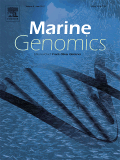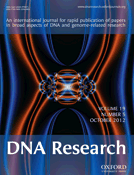
Marine Genomics
Scope & Guideline
Exploring the Depths of Aquatic Genomics
Introduction
Aims and Scopes
- Genomic Sequencing of Marine Microorganisms:
The journal publishes comprehensive genomic sequences of various marine microorganisms, including bacteria, archaea, and eukaryotes, which are crucial for understanding their roles in marine ecosystems. - Functional Genomics and Metagenomics:
Research often involves functional genomics and metagenomic approaches to explore the genetic potential and metabolic pathways of marine species, particularly in relation to biogeochemical cycles. - Biodiversity and Ecological Adaptations:
Marine Genomics emphasizes studies on biodiversity and the ecological adaptations of marine organisms to extreme environments, such as deep-sea hydrothermal vents and polar regions. - Biotechnological Applications:
The journal highlights research on the biotechnological applications of marine organisms, particularly those involved in bioremediation, bioactive compound production, and biocontrol agents. - Transcriptomic Studies:
It also covers extensive transcriptomic analyses that provide insights into gene expression patterns, stress responses, and developmental processes in marine species.
Trending and Emerging
- Antimicrobial and Biocontrol Agents:
There is a growing interest in the genomic analysis of marine bacteria that produce antimicrobial compounds or act as biocontrol agents, showcasing their potential in pharmaceutical applications. - Microbial Ecology and Interactions:
Research focusing on microbial interactions, including symbiotic relationships and community dynamics in marine environments, is on the rise, indicating an increasing recognition of microbial roles in ecosystem functioning. - Metagenomics and Environmental Genomics:
The trend towards metagenomic studies is expanding, with researchers investigating complex microbial communities and their functional capacities in various marine habitats, providing insights into microbial diversity and ecosystem health. - Adaptation to Extreme Environments:
There is a significant increase in studies exploring the genomic adaptations of marine organisms to extreme environments, such as deep-sea trenches and polar regions, highlighting their resilience and potential biotechnological applications. - Biosynthetic Pathways and Secondary Metabolites:
Emerging research on the genomic characterization of biosynthetic pathways for secondary metabolites in marine organisms is gaining traction, emphasizing the potential for discovering novel compounds with pharmaceutical and industrial relevance.
Declining or Waning
- Traditional Marine Ecology Studies:
Research that primarily focuses on traditional ecological studies without a genomic or molecular approach seems to be declining, as the field shifts towards more integrative and molecular methodologies. - Isolated Species Studies:
There is a noticeable decrease in studies exclusively focused on isolated species without broader ecological or genomic context, as the trend moves towards understanding complex interactions within marine ecosystems. - Non-Genomic Environmental Studies:
The journal has seen a reduction in non-genomic studies that address environmental issues such as pollution or climate change impacts without incorporating genomic data or insights, reflecting a shift towards more data-intensive approaches.
Similar Journals

GENOME BIOLOGY
Advancing the frontiers of genomics and molecular biology.GENOME BIOLOGY is a premier, peer-reviewed journal published by BMC, focusing on the rapidly evolving fields of genomics, molecular biology, and bioinformatics. Accessible as an Open Access journal since 2000, it aims to disseminate high-quality, cutting-edge research that contributes to our understanding of genome biology's intricate mechanisms. The journal boasts an impressive impact, ranking 8th in Agricultural and Biological Sciences and 9th in Biochemistry, Genetics and Molecular Biology, highlighting its significance among scholars, professionals, and students alike. With a commitment to facilitating the exchange of invaluable scientific knowledge, GENOME BIOLOGY provides an important platform for discussions on evolutionary biology, genetic systems, and cell biology, contributing to the advancement of these dynamic disciplines.

Evolutionary Bioinformatics
Innovating the intersection of biology and computation.Evolutionary Bioinformatics, published by SAGE Publications Ltd, is a pioneering open-access journal established in 2005, dedicated to advancing the field of evolutionary biology through innovative computational techniques and bioinformatics. With an ISSN of 1176-9343, it serves as a critical platform for researchers, professionals, and students to disseminate impactful findings and foster collaboration across disciplines. The journal spans a broad scope, contributing significantly to the areas of Ecology, Evolution, Behavior and Systematics, and Genetics, as evidenced by its respectable Scopus rankings and quartile placements in 2023. With a commitment to providing comprehensive, peer-reviewed research articles and tools for sharing knowledge, Evolutionary Bioinformatics plays an essential role in shaping the future of evolutionary studies and bioinformatics. Readers and contributors alike are encouraged to engage with cutting-edge research that pushes the boundaries of understanding in this dynamic field.

ANIMAL GENETICS
Pioneering Discoveries in Animal GeneticsANIMAL GENETICS, published by WILEY, is a leading journal in the fields of Animal Science and Zoology, with a commendable Q1 classification for 2023, reflecting its critical role in advancing research and knowledge in animal genetics. Established in 1986, this journal has become a cornerstone for professionals, researchers, and students alike, providing a platform for innovative research that explores the genetic underpinnings of animal biology. With an ISSN of 0268-9146 and an E-ISSN of 1365-2052, it boasts a significant impact in both agricultural and biological sciences, as indicated by its ranking of #74 out of 490 in its category on Scopus, positioning it in the 85th percentile for Animal Science and Zoology. Readers can access high-quality, peer-reviewed articles that not only illuminate current advancements but also foster future research directions. While currently not an open access journal, ANIMAL GENETICS remains vital for anyone engaged in the exploration of genetics and its applications in medicine and beyond, with a continual commitment to publishing findings that shape the future of animal breeding, conservation, and genetics research.

BULLETIN OF MARINE SCIENCE
Navigating the frontiers of marine research.BULLETIN OF MARINE SCIENCE, published by Rosenstiel School of Marine and Atmospheric Science, is a prominent journal dedicated to advancing the field of marine science through scholarly research and peer-reviewed articles. With an ISSN of 0007-4977 and an E-ISSN of 1553-6955, this journal has been contributing to significant scientific discourse since its inception in 1973. Covering a wide spectrum of topics in aquatic sciences and oceanography, it has maintained a respectable position in the academic community, as evidenced by its Q3 ranking in both categories for 2023. Although currently not an open-access journal, it provides essential access to groundbreaking research that informs marine conservation, ecological studies, and atmospheric sciences. Situated in the United States at 4600 Rickenbacker Causeway, Miami, FL 33149, the journal serves as a vital resource for researchers, professionals, and students seeking to engage with the latest findings in marine science and foster a deeper understanding of our oceans.

THALASSAS
Pioneering Insights for Sustainable Aquatic ManagementTHALASSAS is a prominent academic journal specializing in the fields of Aquatic Science and Oceanography, published by Springer International Publishing AG. Established in 2005 and running through 2024, this journal serves as a vital platform for sharing groundbreaking research and innovative findings related to the marine environment and its ecosystems. With an ISSN of 0212-5919 and an E-ISSN of 2366-1674, THALASSAS is indexed in Scopus and currently holds a Q3 classification in both Aquatic Science and Oceanography for 2023, reflecting its relevance and contribution to these scientific disciplines. Although it does not follow an Open Access model, THALASSAS offers valuable insights for researchers, professionals, and students interested in sustainable ocean management and aquatic biodiversity. Its rigorous peer-review process ensures that published articles meet the highest standards of academic quality, fostering a deeper understanding of marine sciences and addressing critical issues facing aquatic systems today.

MARINE BIOTECHNOLOGY
Harnessing Oceanic Potential for Global ImpactMarine Biotechnology is a premier journal published by Springer, specializing in the interdisciplinary research at the intersection of marine biology and biotechnology. With an ISSN of 1436-2228 and a robust e-ISSN of 1436-2236, this journal has been a cornerstone for scholars and practitioners since its inception in 1999, and is positioned to continue shaping the field through 2024. Recognized for its contributions in Aquatic Science and Biotechnology, it currently holds a Q2 ranking in both categories for 2023, highlighting its relevance and impact within the global scientific community. With a Scopus rank of 64/247 in Aquatic Science and 149/311 in Biotechnology, Marine Biotechnology offers a vital platform for disseminating cutting-edge research that encompasses environmental sustainability, pharmaceutical applications, and bioinformatics. The journal promotes open access to its valuable content, ensuring that research is readily available to a wide audience. By bringing together leading researchers and fostering collaborations, Marine Biotechnology stands as an essential resource for those committed to advancing our understanding of marine resources and their applications in biotechnology.

CAHIERS DE BIOLOGIE MARINE
Navigating the Depths of Marine KnowledgeCAHIERS DE BIOLOGIE MARINE, published in France, is a distinguished journal in the field of Aquatic Sciences, known for its interdisciplinary exploration of marine biological research. With ISSN 0007-9723 and E-ISSN 2262-3094, it has served as a vital platform for disseminating scientific knowledge since its inception in 1992. The journal is indexed in Scopus, where it currently holds a position of rank #172 out of 247 in the Aquatic Science category, landing in the 30th percentile, reflecting its commitment to quality research in the domain. Although it operates as a traditional access journal, CAHIERS DE BIOLOGIE MARINE encourages scholarly contribution from both emerging and established researchers, making significant strides in understanding marine ecosystems and biota. As such, it remains an essential resource for professionals and students aiming to contribute to the growing body of knowledge in aquatic sciences.

Genetics Research
Illuminating the Path of Genetic UnderstandingGenetics Research, published by HINDAWI LTD, is a distinguished open access journal that has been at the forefront of genetic studies since its inception in 1960. With the transition to open access in 2019, this journal has expanded its accessibility, fostering knowledge dissemination across the global scientific community. Operating out of the United Kingdom, it provides a platform for innovative research in the fields of genetics and molecular biology, encompassing a broad range of topics that are highly relevant to medical sciences. As of 2023, it holds a Q4 classification in Genetics and a Q3 classification in miscellaneous Medicine, reflecting its ongoing commitment to scholarly excellence amidst shifting academic landscapes. While the journal's H-index remains unlisted, its indexed ranking within Scopus, with a rank of #325/328 in the Genetics category highlights the challenges ligated to its niche audience. Nevertheless, it serves as a crucial resource for researchers, professionals, and students eager to contribute to and stay informed on the latest genetic research trends and breakthroughs.

DNA RESEARCH
Transforming molecular biology insights into impactful solutions.DNA RESEARCH is a pioneering open-access journal published by Oxford University Press, dedicated to advancing the field of genetics and molecular biology. Since its inception in 1994, the journal has been at the forefront of scientific innovation, providing a global platform for researchers to publish high-quality findings that drive the understanding of DNA and its implications in medicine. With an impactful presence characterized by a Q2 ranking in Genetics, a Q1 ranking in Medicine (miscellaneous), and a Q2 ranking in Molecular Biology as per the latest 2023 assessments, DNA RESEARCH stands as a vital resource for both established scholars and emerging scientists. The journal's diverse range of articles caters to a wide audience, fostering collaboration and the sharing of knowledge. Researchers, professionals, and students alike will find an abundance of cutting-edge research and insights that can inform their work and further their understanding of this critical scientific domain. For more information and to access articles, visit the journal's website at Oxford University Press.

BIOLOGY BULLETIN
Exploring the Frontiers of Agricultural and Biological Sciences.BIOLOGY BULLETIN is a prominent academic journal published by PLEIADES PUBLISHING INC, dedicated to advancing the fields of Agricultural and Biological Sciences as well as Biochemistry, Genetics, and Molecular Biology. With an ISSN of 1062-3590 and E-ISSN of 1608-3059, the journal has been a vital resource for researchers and professionals since its commencement in 1996. Located in the United States, BIOLOGY BULLETIN operates within a highly competitive academic landscape, achieving a 2023 ranking in the Q3 quartile for Agricultural and Biological Sciences and Q4 for Biochemistry, Genetics, and Molecular Biology, highlighting its commitment to delivering impactful research despite its challenges. Researchers seeking to publish their findings will find a platform for significant insights, as reflected in its Scopus rankings, where it stands at #183 and #199 out of 221 in its respective categories, showcasing opportunities for growth and visibility. While currently not an open-access publication, BIOLOGY BULLETIN plays a crucial role in facilitating scholarly communication and fostering an understanding of biological sciences, making it an essential read for academics, professionals, and students alike.